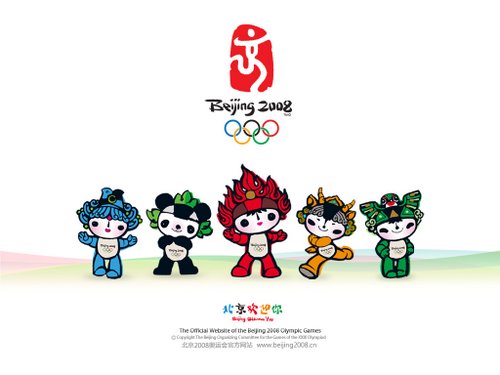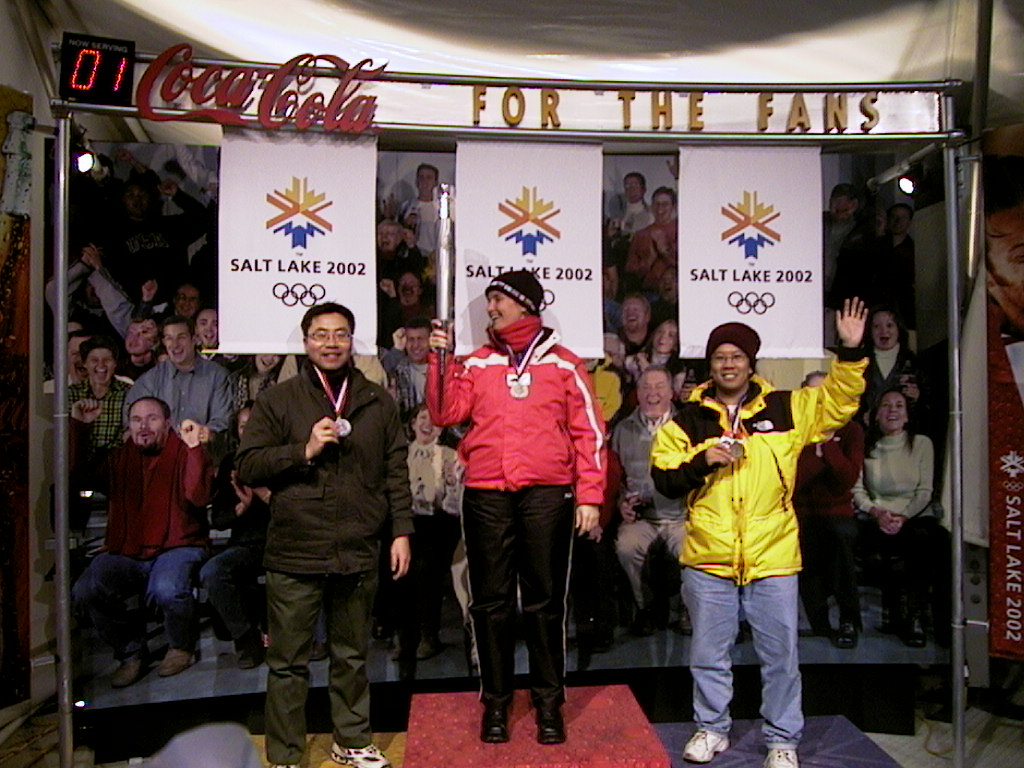With less than a week to go until the 2008 Beijing Olympics, I was wondering when I was going to come across this kind of article, as I had read in Sunday’s San Jose Mercury News’s “For Chinese-Americans, Beijing Olympics bring mixed emotions“:
“…Chinese-American views on the 29th Olympiad in Beijing often depend on where their families came from. Did they immigrate from the mainland? Or from Hong Kong or Taiwan? Or were their families part of the centuries-old diaspora that scattered Chinese across Asia – in places such as Vietnam, Indonesia, Thailand and the Malay Peninsula? Their attitudes also depend on whether their families came to America as traditional immigrants or political refugees. Some do business in China, while others have linked up with U.S. human rights groups to protest political and religious persecution there. Attitudes toward the Olympics also reflect the arc of Chinese-American politics since 1989, when the world was riveted and then horrified by the events in Tiananmen Square. As China in the past two decades has gone from international pariah to economic superstar, the country’s critics have had to soften their tactics.”
As a Taiwanese-American, I am certainly not a fan many of China’s many official policies, most notably China’s consideration of Taiwan as a rogue state that it considers as part of China politically, and has stated many times that it would take Taiwan by military force if Taiwan ever officially declared itself independent.
However, most Taiwanese-Americans I think would consider themselves “Chinese” (in the “Han Chinese” ethnic sense) as well as much of Taiwan’s culture is rooted in China and most descendants can trace their ancestry to Fujian province during immigration in the 16th century. So it is with certain ethnic pride that the 2008 Olympics will be held in China. As I have blogged before, you can be anti-People’s Republic of China (the government) and still be pro-China – for the people, the culture and the country.
The first time the modern day Olympics were held in Asia was in 1964 in Tokyo, which was very much considered a “coming out” party for Japan, post-World War II. The second time was in 1988 in South Korea, where the Olympics was most successful in pushing the government to adopt and move towards what is today, a thriving democracy. And finally, China in 2008. If you know the history of China’s Olympic bids, China very much wanted to win the 2000 Olympics, which went to Sydney, Australia. China was ecstatic when it was announced that it had won the right to host the Olympics in July of 2001.
Newsweek had a cover story last week on “What Drives China: The Roots of a National Inferiority Complex,” which does a GREAT job summarizing the history of China’s humilities:
“…As I argue in the current New York Review of Books, the most critical element in the formation of China’s modern identity has been the legacy of the country’s “humiliation” at the hands of foreigners, beginning with its defeat in the Opium Wars in the mid-19th century and the shameful treatment of Chinese immigrants in America. The process was exacerbated by Japan’s successful industrialization. Tokyo’s invasion and occupation of the mainland during World War II was in many ways psychologically more devastating than Western interventions because Japan was an Asian power that had succeeded in modernizing, where China had failed.”
If you don’t know much of China’s “recent” history of the past 150 years, I highly recommend reading that Newsweek article. For most of China’ history, it was indeed the Middle Kingdom (i.e. directly translated, China is the Middle Kingdom) – the most advanced economically (having the largest GDP in the world until the 20th Century), politically,militarily, and of course, in its opinion, culturally.
China not only sees the Olympics as its coming out party, but very much a cathartic historic event to launch China to be a leader in every way in the 21st century. Despite some controversies regarding the actual logistics of the Olympics – like possible press and Internet censorship, I truly hope that Beijing Olympics are peaceful and without violent incidence. I hope that Americans do learn more about China, beyond the economic or potential future military fears that they may have. As Asian Americans, I think we have a vested interested in how all Americans view the Chinese, because to many Americans – sadly, we might look all the same… As noted in today’s commentary in the New York Times, “China’s Moment: Referendum on a Nation“:
“We all have to live with one another awhile longer. Wouldn’t it be good for everybody if the world came out of the Olympics knowing and liking China a little more than before?”
I am often amused when my fellow Americans comment how China is a Communist country and have images of the country as not being modern. Of course, much of China is still very poor, but if you visit any of the major cities like Beijing, Shanghai, Shenzen or Hong Kong, those cities will make San Francisco, San Jose and Oakland look like small towns…
As much as I can’t stand President George W. Bush, I am glad that he is attending the Opening Ceremonies and attending many events. America and the world needs to be engaged with China, not enraged with them. This is not to say that we shouldn’t kowtow to their every wants and needs so that we can eagerly access their markets and literally sell to the billions of people in China. And as noted in this New York Times piece, “Despite Flaws, Rights in China Have Expanded.”
“…But Chinese people also increasingly live where they want to live. They travel abroad in ever larger numbers. Property rights have found broader support in the courts. Within well-defined limits, people also enjoy the fruits of the technological revolution, from cellphones to the Internet, and can communicate or find information with an ease that has few parallels in authoritarian countries of the past. “Some people will tell you, look at the walls, and say they are still pretty high, while others will tell you that there is a lot of space between the walls,” said Nicholas Bequelin, a China specialist at Human Rights Watch. “Both things are true.””
We cannot and should not expect a country to change overnight, especially such a large country as China. From the nadir of Tiananmen Square on June 4th, 1989 to August 8th, 2008 and beyond, China has been changing for the better.
Having been to the 2002 Salt Lake City Winter Olympics, I can tell you that there is truly an Olympic spirit that is in the air that is very, very special.
Whenever I hear the Olympic theme and fanfare, chills go down my spine! So I’ll be looking forward to watching the Olympics – seeing the grandeur of the Olympic venues (China has spent something like over $40 billion on new venues and infrastructure improvements) as well as the competitions. And hopefully, the air will clear up before the games begin!










